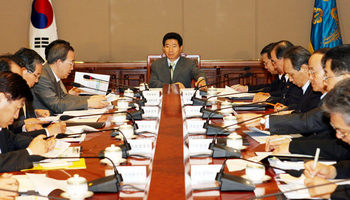 |
|
South Korea's President Roh Moo-hyun holds a meeting at the Blue House in Seoul on July 19.
|
Increased sanctions expected in near future, sources say
The United States seems to be abandoning work towards a diplomatic solution to the North Korean missile issue and instead moving to intensify pressure on Pyongyang with measures like financial sanctions. U.S. state secretary Condoleezza Rice was scheduled to travel to Asia early next week but those plans have been postponed because of the situation in Lebanon. Some observers are calling this part of a continued policy of intentionally ignoring North Korea. One South Korean government official recently back from a visit to Washington D.C. said the U.S. will take additional action against Pyongyang if it continues to refuse to join the six-party talks. Sources familiar with the U.S. administration say that in addition to financial sanctions, it is moving to initiate land and even sea checks on materials related to missile and weapons of mass destruction. U.S. Treasury Department undersecretary Stuart Levey, responsible for counterterrorism financial measures, recently visited South Korea, Vietnam, Singapore, and Japan to discuss additional sanctions on North Korea. Following his three day visit in Seoul, Levey issued a statement saying he had discussed with South Korean officials "issues of common interest, including the new U.N. Security Council resolution that requires all member states to prevent the transfer of any financial resources in relation to North Korea’s missile or weapons of mass destruction programs." He is reported to have made it clear the U.S. has no intention of removing measures on the Macao-based Banco Delta Asia, which is accused of money laundering on behalf of Pyongyang.Under the leadership of chief cabinet secretary Shinzo Abe, the Japanese government has begun preparations for additional measures against North Korea that it hopes to initiate early next month. Abe writes in a book available in bookstores July 20 that even if intercepting North Korean funds "does not deliver the decisive blow that makes the government collapse," it could bring about a "chemical change," hinting that the desire is for a change of government. On Wednesday, president Roh Moo-hyun drew a clear line separating himself from recent hard-line responses from the U.S. and Japan when he said "excessive responses" in certain quarters create "unnecessary tension and confrontation" and "do not help resolve the situation." The Blue House said right now is "a time when we need to concentrate on dialogue and persuasion instead of creating crisis and confrontation." "We are going to make a multi-faceted effort to make North Korea return to the six-party talks," said presidential security advisor Song Min-soon. Also on Wednesday, foreign minister Ban Ki-moon, asked about reports that the U.S. is beginning to question funds entering North Korea through the Gaeseong (Kaesong) industrial park and tours to Mount Geumgang (Kumgang), said, "the Security Council resolution and the Gaeseong industrial park are unrelated and will remain so."






